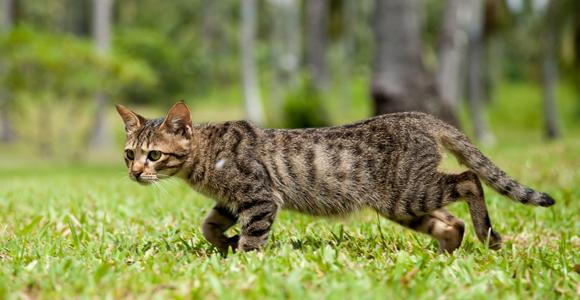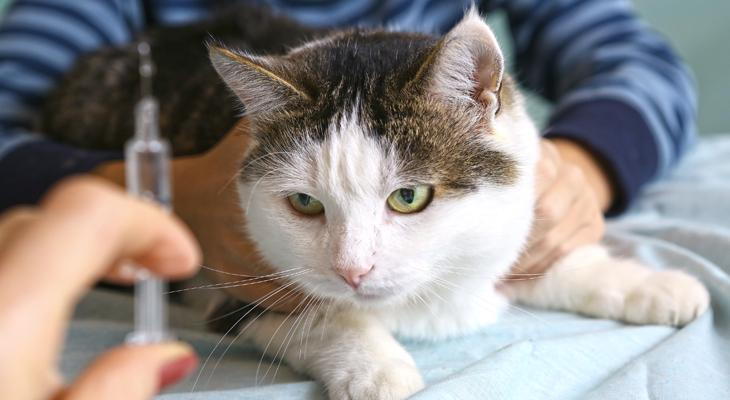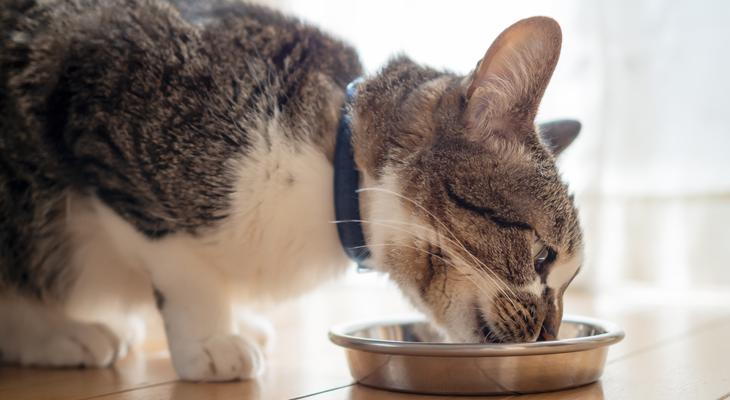- Home >
- Reasons Your Cat May Be Losing Weight
Reasons Your Cat May Be Losing Weight

Your cat's weight can say a great deal about his or her health. An overweight cat may have a thyroid issue, and it puts them at a greater risk of certain health conditions.
On the other hand, if your cat is losing weight, and not by you regulating food intake to help with weight control, it may indicate an infection, parasite, thyroid disorder, kidney problem, anxiety, or another issue that requires the care of a vet. Here are some common causes for weight loss in felines:
Feline Diabetes

If your feline develops diabetes, it may lose weight. As your pet's cells cannot use glucose for energy, the organs and muscles do not receive the energy they need. Your pet might become hungrier than usual, and his or her body may use muscle and fat for energy, causing weight loss.
Your pet may be thirstier than normal if it has diabetes. This condition requires treatment or it could lead to organ damage. Moreover, the condition is fatal without treatment.
Hyperthyroidism
Hyperthyroidism is a condition that occurs when your cat produces too much thyroxine, a hormone that regulates your feline's metabolism. With too much, your furry friend's metabolism goes into hyperdrive. This metabolic change causes weight loss.
Your pet's heart rate may increase and you might notice that he or she has difficulty sleeping. Hyperthyroidism may also cause excessive thirst and higher urine output.
Anxiety or Stress
Your pet may become stressed over a recent change, such as a move or a new pet. If you have anyone in your house who is cruel or abusive to the feline, it could also cause anxiety.
The anxiety or stress will cause your pet to lose its appetite. Sometimes, stress leads to frequent vomiting, which can also alter your pet's weight.
Kidney Disease
Kidney disease occurs when one or both of your pet's kidneys start to malfunction. They can't function to filter the urea and other waste products in the blood as they should. The kidneys also produce certain hormones, one of which helps regulate your blood pressure. Kidney disease is progressive, and it can even lead to death without treatment.
Cats between the ages of 10 and 15 are most at risk. The symptoms of kidney disease include the following:
- Weight loss
- Appetite loss
- Increased thirst
- Excessive urination
- Vomiting
- Anemia
- Diarrhea
Not Getting Enough Food
Sometimes, the issue isn't a health problem. You may not be feeding your pet enough. If a child is responsible for feeding the pet, your child might not be feeding the cat as he or she should. On the other hand, if you have another cat or dog, he or she could be stealing this feline's food.
Cancer
Your pet may have a loss of appetite if it has certain types of cancer. As your cat’s body is trying to fight cancer, it may be burning excessive calories, which will result in weight loss. Ovarian or stomach cancer could cause a tumor that places pressure on the stomach, causing your pet to feel less hungry than usual.
Intestinal Parasites
Intestinal parasites will suck nutrients from your pet and cause weight loss. Your pet could develop hookworms from sniffing contaminated stool or consuming an infected item.
Tapeworms are consumed via infected water or food. Your cat might develop roundworms from licking or sniffing contaminated stool. Other animals, such as infected rodents or cockroaches, could spread roundworms.
Feline Viral Disease
A cat could develop FIP, FIV, or FeLV, which are viral infections that can all cause weight loss.
With FIP, feline infectious peritonitis, your pet comes in contact with the FIP coronavirus, usually through feces. Listlessness and a decreased appetite are also possible. Your cat might feel lethargic or develop a fluctuating fever.
Feline immunodeficiency virus (FIV) attacks your cat's immune system, leaving it vulnerable to other infections. Typically, FIV comes from bites, although a pregnant mother may transmit it to her kittens during birth, though it's not common.
Feline leukemia virus, also known as FeLV, suppresses your pet's immune system. Your cat may develop anemia or lymphoma. It makes your pet more vulnerable to other infections.
Dental Problems
If your pet has a tooth that's bothering him or her or has gum disease, it may hurt him or her to eat. As a result, your pet might lose weight.
Treating the Cause
Each case is different and the treatment for your cat’s weight loss varies depending on the cause. Here is what you can do to prevent weight loss in your pet:
Giving Your Cat an Adequate Amount of Food

If it's an issue with not enough food, you'll need to feed your cat in a separate room from your other pets. Watch your children and make sure they're feeding the feline enough. You can also try increasing their food intake.
Staying on Top of Your Feline’s Diabetes
With diabetes, you'll need to regulate your pet's diet and make sure it gets an adequate amount of exercise. Some pets may require oral medication or insulin.
Treating Hyperthyroidism
If testing concludes your pet has hyperthyroidism, the vet will prescribe an anti-thyroid drug to decrease thyroid function.
Calming Anxiety
When anxiety or stress is the culprit, the vet may suggest ways to relieve your pet's stress, such as through lifestyle changes. Some pets may require an antianxiety medication.
Caring for Kidney Problems
Your pet may receive a prescription for a blood pressure medication, an antiemetic, or a different type of drug. Diet changes can help.
Cancer Treatment
Cancer treatment depends on the type of cancer and the stage. It could consist of surgery, immunotherapy, chemotherapy, or possibly a combination.
Intestinal Parasites Medication
Intestinal parasites will require an antiparasitic.
Feline Viral Disease Medication
If your pet has one of the feline viral diseases, a vet may prescribe medications to fight secondary infections. Your pet could also require an immune-boosting drug or a medication to combat inflammation.
Receiving Dental Services
The treatment for dental problems depends on the issue. Gum disease requires an antibiotic and deep cleaning, while your pet may need to have a root removal for a severely decayed tooth.
Monitoring Your Cat’s Weight
Weight loss is a sign of various problems that range in severity. Through a physical evaluation and diagnostics, a vet can diagnose the cause and determine the appropriate treatment.

Your cat's weight can say a great deal about his or her health. An overweight cat may have a thyroid issue, and it puts them at a greater risk of certain health conditions.
On the other hand, if your cat is losing weight, and not by you regulating food intake to help with weight control, it may indicate an infection, parasite, thyroid disorder, kidney problem, anxiety, or another issue that requires the care of a vet. Here are some common causes for weight loss in felines:
Feline Diabetes

If your feline develops diabetes, it may lose weight. As your pet's cells cannot use glucose for energy, the organs and muscles do not receive the energy they need. Your pet might become hungrier than usual, and his or her body may use muscle and fat for energy, causing weight loss.
Your pet may be thirstier than normal if it has diabetes. This condition requires treatment or it could lead to organ damage. Moreover, the condition is fatal without treatment.
Hyperthyroidism
Hyperthyroidism is a condition that occurs when your cat produces too much thyroxine, a hormone that regulates your feline's metabolism. With too much, your furry friend's metabolism goes into hyperdrive. This metabolic change causes weight loss.
Your pet's heart rate may increase and you might notice that he or she has difficulty sleeping. Hyperthyroidism may also cause excessive thirst and higher urine output.
Anxiety or Stress
Your pet may become stressed over a recent change, such as a move or a new pet. If you have anyone in your house who is cruel or abusive to the feline, it could also cause anxiety.
The anxiety or stress will cause your pet to lose its appetite. Sometimes, stress leads to frequent vomiting, which can also alter your pet's weight.
Kidney Disease
Kidney disease occurs when one or both of your pet's kidneys start to malfunction. They can't function to filter the urea and other waste products in the blood as they should. The kidneys also produce certain hormones, one of which helps regulate your blood pressure. Kidney disease is progressive, and it can even lead to death without treatment.
Cats between the ages of 10 and 15 are most at risk. The symptoms of kidney disease include the following:
- Weight loss
- Appetite loss
- Increased thirst
- Excessive urination
- Vomiting
- Anemia
- Diarrhea
Not Getting Enough Food
Sometimes, the issue isn't a health problem. You may not be feeding your pet enough. If a child is responsible for feeding the pet, your child might not be feeding the cat as he or she should. On the other hand, if you have another cat or dog, he or she could be stealing this feline's food.
Cancer
Your pet may have a loss of appetite if it has certain types of cancer. As your cat’s body is trying to fight cancer, it may be burning excessive calories, which will result in weight loss. Ovarian or stomach cancer could cause a tumor that places pressure on the stomach, causing your pet to feel less hungry than usual.
Intestinal Parasites
Intestinal parasites will suck nutrients from your pet and cause weight loss. Your pet could develop hookworms from sniffing contaminated stool or consuming an infected item.
Tapeworms are consumed via infected water or food. Your cat might develop roundworms from licking or sniffing contaminated stool. Other animals, such as infected rodents or cockroaches, could spread roundworms.
Feline Viral Disease
A cat could develop FIP, FIV, or FeLV, which are viral infections that can all cause weight loss.
With FIP, feline infectious peritonitis, your pet comes in contact with the FIP coronavirus, usually through feces. Listlessness and a decreased appetite are also possible. Your cat might feel lethargic or develop a fluctuating fever.
Feline immunodeficiency virus (FIV) attacks your cat's immune system, leaving it vulnerable to other infections. Typically, FIV comes from bites, although a pregnant mother may transmit it to her kittens during birth, though it's not common.
Feline leukemia virus, also known as FeLV, suppresses your pet's immune system. Your cat may develop anemia or lymphoma. It makes your pet more vulnerable to other infections.
Dental Problems
If your pet has a tooth that's bothering him or her or has gum disease, it may hurt him or her to eat. As a result, your pet might lose weight.
Treating the Cause
Each case is different and the treatment for your cat’s weight loss varies depending on the cause. Here is what you can do to prevent weight loss in your pet:
Giving Your Cat an Adequate Amount of Food

If it's an issue with not enough food, you'll need to feed your cat in a separate room from your other pets. Watch your children and make sure they're feeding the feline enough. You can also try increasing their food intake.
Staying on Top of Your Feline’s Diabetes
With diabetes, you'll need to regulate your pet's diet and make sure it gets an adequate amount of exercise. Some pets may require oral medication or insulin.
Treating Hyperthyroidism
If testing concludes your pet has hyperthyroidism, the vet will prescribe an anti-thyroid drug to decrease thyroid function.
Calming Anxiety
When anxiety or stress is the culprit, the vet may suggest ways to relieve your pet's stress, such as through lifestyle changes. Some pets may require an antianxiety medication.
Caring for Kidney Problems
Your pet may receive a prescription for a blood pressure medication, an antiemetic, or a different type of drug. Diet changes can help.
Cancer Treatment
Cancer treatment depends on the type of cancer and the stage. It could consist of surgery, immunotherapy, chemotherapy, or possibly a combination.
Intestinal Parasites Medication
Intestinal parasites will require an antiparasitic.
Feline Viral Disease Medication
If your pet has one of the feline viral diseases, a vet may prescribe medications to fight secondary infections. Your pet could also require an immune-boosting drug or a medication to combat inflammation.
Receiving Dental Services
The treatment for dental problems depends on the issue. Gum disease requires an antibiotic and deep cleaning, while your pet may need to have a root removal for a severely decayed tooth.
Monitoring Your Cat’s Weight
Weight loss is a sign of various problems that range in severity. Through a physical evaluation and diagnostics, a vet can diagnose the cause and determine the appropriate treatment.
Contact Us
Thank you. Your submission has been sent.

